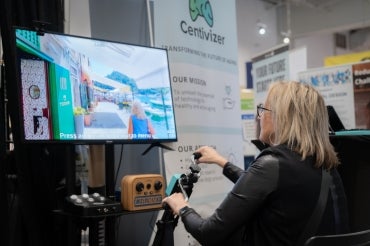Healthy aging in place: New pilot program to provide high-tech cognitive, physical enrichment for seniors

2RaceWithMe, a tool developed by Professor Mark Chignell from the department of mechanical and industrial engineering in U of T's Faculty of Applied Science & Engineering, combines physical and cognitive engagement by requiring users to pedal to be able to watch scenic videos (photo by Justin Greaves/Centivizer)
Published: August 22, 2024
Older adults living in a Toronto co-operative apartment building will soon have access to high-tech activity spaces designed to promote cognitive, physical and social enrichment, thanks to a new pilot project led by the University of Toronto’s Mark Chignell.
The activity spaces aim to promote healthy aging for older adults who are aging in place – meaning they have the social and health supports to live safely and independently. They will be located in the communal area of a City Park co-op building that is considered a naturally occurring retirement community, where more than 30 per cent of occupants are over the age of 65.
The initiative was launched by Chignell, a professor in the department of mechanical and industrial engineering in U of T’s Faculty of Applied Science & Engineering, in collaboration with HelpAge Canada, a non-profit that supports community-based services for seniors, and AGE-WELL, a research network and U of T institutional strategic initiative.
It’s one of nine projects to be supported by 2024-25 Community Partnership Research Program awards, given by U of T’s Connaught Fund with the aim of accelerating research carried out in collaboration with community partners and driven by their needs and priorities.
“My work is motivated by the fact that physical and cognitive health can decline very quickly for older adults,” says Chignell.
“We know the physical body and brain work together, and that physical exercise is important for cognitive status and preventing dementia. So being able to promote more active lifestyles for people who are still living independently in the community can have an immense benefit for our society.”
The activity spaces will feature products from Centivizer, a U of T startup spun off from Chignell’s research, that specializes in creating interactive activities, games and cognitive assessment tools to support healthy aging.
These include 2RaceWithMe, a device that promotes both physical and cognitive engagement by having users pedal while watching scenic videos that only play when the pedals are in motion.
Centivizer has also developed a suite of whack-a-mole-style games for cognitive assessment that Chignell hopes can be used to promote cognitive safety in clinical practice.
A two-time recipient of Connaught Innovation Awards, Chignell says he feels honoured to now receive support from the Connaught Fund's Community Partnership Research Program.
“The Connaught is a great validation as I start this project in naturally occurring retirement communities,” says Chignell. “I am also continuing to work with retirement homes and long-term care centres, including a new collaboration with a long-term care home in Tokyo, Japan.
“I’m hoping that this project will demonstrate the value of using our products in the community to help older people retain their physical and cognitive abilities for longer.”



